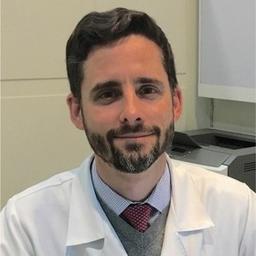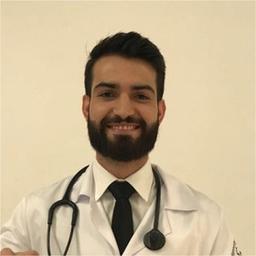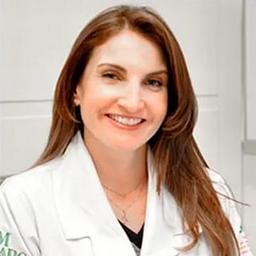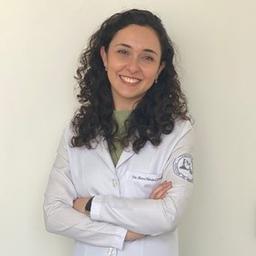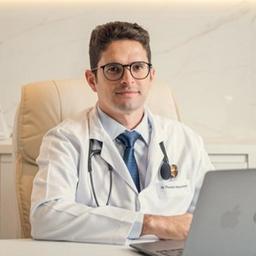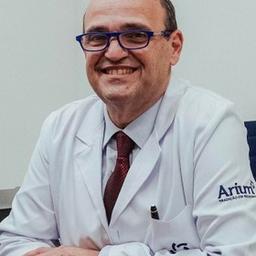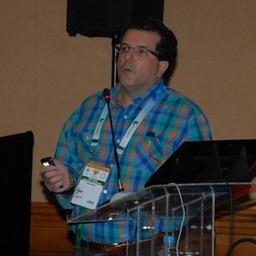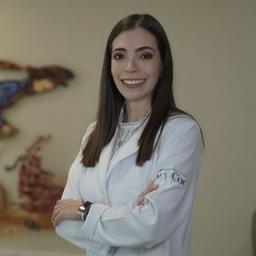Additional Filters
Oncologists
Found 20 oncologists
Prof. Auro Del Giglio
Oncologist and Hematologist in São Paulo
Oncologist
Dr. Ludmilla Mineiro Gomes
Oncologist in São Paulo
Oncologist
Video consultation
Video consultation
Dr. Daniel I G Cubero
Oncologist in São Paulo
Oncologist
Dr. Tiago Esteves Filippini
Clinical Oncologist and General Practitioner in São Paulo and ABC São Paulo
Oncologist
Video consultation
Video consultation
Dr. Patricia Xavier Santi
Oncologist at the ABC Oncology Center (CEON) in São Paulo
Oncologist
Dra. Bianca Mendes Carnevalli
Clinical oncology in São Paulo
Oncologist
Video consultation
Video consultation
Dr. Suelen Patricia dos Santos Martins
Oncologist Researcher in São Paulo
Oncologist
Dr. Thayles Vinícius Moraes
Specialist in Clinical Oncology in São Paulo
Oncologist
Dr. Marcela Henriques Barreto Papalardo
Palliative Oncologist in São Paulo
Oncologist
Dr. Marcos Aurélio Fonseca Magalhães Filho
Clinical Oncology in São Paulo
Oncologist
Dr. Raíssa Rodrigues Melo Dantas
Clinical Oncologist and Palliative Care in São Paulo
Oncologist
Dr. Glaucia Medeiros Ribeiro
Oncologist and Palliative Care in Sorocaba
Oncologist
Dr. Marcelo Soares Schalch
General and Head and Neck Surgery Specialist in São Paulo
Oncologist
Visitors who were interested in oncologists also searched for:
Oncologists by cities
Visitors who were interested in oncologists also searched for:
General information on medical treatment
The importance of oncologists in public health
Oncologists play a fundamental role in the fight against cancer, a condition that affects millions of people and is among the leading causes of death worldwide. These specialists not only treat patients individually but also contribute to research and advances that benefit the entire society. Studies show that early diagnosis and appropriate treatment provided by competent oncologists significantly increase survival rates and improve patients' quality of life.
The cancer patient's journey
Receiving a cancer diagnosis marks the beginning of a challenging journey that requires specialized and continuous monitoring. This journey includes distinct phases: accurate diagnosis, therapeutic planning, specific treatment, monitoring of results, and rehabilitation. Success depends not only on the effectiveness of medical interventions but also on the trust relationship established with the oncologist and the active participation of the patient in their own healing process.
Phases of psychological adaptation
Patients often go through a complex emotional process that includes initial shock, denial, anger, bargaining, depression, and finally acceptance. Adequate psychological support during all these phases is essential for healthy coping with the disease and adherence to the treatment proposed by the oncologist.
What a complete oncological assessment entails
Oncological assessment is thorough and personalized for each patient. The specialist conducts a detailed medical history, complete physical examination, and requests specific tests according to clinical suspicion. Imaging tests such as CT scans, MRIs, PET-CT, and biopsies may be necessary to confirm the diagnosis and determine specific characteristics of the tumor, which are fundamental for choosing the appropriate treatment.
Essential diagnostic tests
Laboratory tests, tumor markers, advanced imaging exams, and anatomopathological and molecular analyses form the basis of modern oncological assessment, allowing accurate diagnoses and targeted therapies that consider the genetic and molecular particularities of each tumor.
Criteria for seeking an oncologist
It is recommended to consult an oncologist when there is suspicion of cancer based on persistent symptoms, changes in routine exams, significant family history of cancer, or after referral from another doctor who identified concerning signs. Early diagnosis is crucial to increase chances of cure; therefore, specialized consultation should not be postponed when there are indications for it.
Specific cases of oncological referral
Patients with suggestive changes in screening tests (such as mammography, colonoscopy, or altered PSA), suspicious skin lesions, or symptoms such as unexplained weight loss, abnormal bleeding, or palpable nodules should be promptly evaluated by an oncologist. Current clinical protocols recommend rapid referral to reduce the time between suspicion, diagnosis, and treatment initiation, a critical factor for prognosis in various types of cancer.
Types of oncological specialties
Clinical oncology
Medical specialty dedicated to the diagnosis and treatment of cancer using systemic therapies such as chemotherapy, hormone therapy, immunotherapy, and targeted therapies. The clinical oncologist coordinates the comprehensive care of the patient, from diagnosis to long-term follow-up, often being the professional who manages the multidisciplinary team. This specialty requires extensive knowledge about different types of cancer and their manifestations, as well as mastery of the latest therapeutic protocols and the ability to manage treatment side effects.
Surgical oncology
Surgical subspecialty focused on the removal of tumors and tissues affected by cancer, playing a crucial role in the diagnosis, staging, and treatment of the disease. The surgical oncologist performs procedures ranging from diagnostic biopsies to complex resections with reconstructions, using minimally invasive techniques when possible. Modern oncological surgery seeks not only to eliminate the tumor but to maximally preserve organ functionality and patient quality of life, often being combined with other therapeutic modalities.
Radiation oncology
Specialty that uses ionizing radiation to destroy cancer cells or prevent their multiplication, which can be used with curative or palliative intent. The radiation oncologist plans personalized treatments that maximize the effect on the tumor while minimizing damage to adjacent healthy tissues. Technological advances such as IMRT, image-guided radiotherapy, and stereotactic radiosurgery allow increasingly precise and effective treatments, with lower toxicity and better preservation of quality of life.
Hematologic oncology
Specialty that combines the study of blood diseases with the treatment of hematological cancers such as leukemias, lymphomas, and multiple myeloma. The hematologic oncologist has expertise in the molecular diagnosis of these complex diseases and in the management of specific therapies, including hematopoietic stem cell transplantation. This area has experienced remarkable advances with the development of immunotherapies such as CAR-T cells and monoclonal antibodies, revolutionizing the treatment of diseases previously considered incurable.
Preparation for the oncological consultation
For the first consultation with the oncologist, it is important to bring all tests already performed, complete medical history, and a list of medications being used. Be prepared to provide detailed information about symptoms, their duration, and evolution. It is advisable to bring a companion for emotional support and help in retaining the information shared during the consultation, which tends to be dense and emotionally challenging.
What to expect from the first consultation
The first consultation is usually longer and includes detailed medical history, complete physical examination, review of previous tests, and discussion about next diagnostic or therapeutic steps. The oncologist will explain their initial impression and establish an investigation or treatment plan, always considering the preferences and particularities of the patient.
The crucial role of psychological support
Psychological counseling is an integral part of successful oncological treatment. A cancer diagnosis generates significant psychological impact not only on the patient but on their entire support network. Professionals specialized in psycho-oncology use techniques such as cognitive-behavioral therapy and mindfulness to assist in managing stress, anxiety, and depression often associated with diagnosis and treatment. Adequate emotional support is correlated with better treatment adherence, improved quality of life, and, in some studies, with better clinical outcomes.
Therapeutic support groups
Participation in support groups with other cancer patients provides a space for sharing experiences, coping strategies, and practical information on how to deal with treatment challenges. These meetings facilitate emotional expression in an environment of mutual understanding and can significantly reduce feelings of isolation often experienced during treatment.
Potential risks and complications of treatments
Side effects of chemotherapy
Nausea, fatigue, hair loss, neutropenia, and peripheral neuropathy are some of the common adverse effects of systemic therapies, varying according to the medications used and individual patient characteristics. Proper management of these symptoms is a fundamental part of modern oncological treatment, with specific protocols to prevent or minimize each side effect. Significant advances in supportive medications now allow many patients to maintain a satisfactory quality of life even during intensive chemotherapy cycles.
Complications of radiotherapy
Skin reactions, fatigue, mucosal changes, and specific effects related to the irradiated area may occur during or after treatment, requiring specialized care for their prevention and management. The severity of these reactions varies according to total dose, irradiated volume, and individual patient characteristics. Modern radiotherapy, with techniques such as IMRT and IGRT, has significantly reduced the incidence of serious side effects, improving tolerance to treatment.
Surgical sequelae
Post-operative pain, functional limitations, aesthetic changes, and, in some cases, complications such as infections or suture dehiscence may require specific care and adequate rehabilitation. Close monitoring by the surgical and rehabilitation team is essential for early identification and proper management of these complications. Advanced surgical techniques, such as minimally invasive surgeries and reconstructive procedures, have contributed to reducing the functional and cosmetic impact of oncological interventions.
Post-treatment follow-up and adaptation to a new lifestyle
Follow-up after initial treatment follows specific protocols according to the type of cancer, generally with periodic consultations and exams in the first years, when the risk of recurrence is greater. This phase, known as "surveillance", is crucial for early detection of possible recurrences or late effects of treatment. In addition to medical monitoring, adoption of a healthy lifestyle is recommended, including balanced nutrition, regular physical activity, and abandonment of harmful habits such as smoking and excessive alcohol consumption.
Phases of oncological follow-up
Oncological follow-up varies according to the risk of recurrence and time elapsed since initial treatment, being more intensive in the first years and gradually spaced out as clinical stability is achieved. Follow-up protocols are personalized considering the type of tumor, initial staging, response to treatment, and individual risk factors.
Physical activity for cancer patients
Regular physical activity is highly recommended for patients undergoing cancer treatment and cancer survivors, and should be adapted to individual conditions and treatment phase. Studies show that appropriate physical exercise reduces cancer-related fatigue, improves functional capacity, strengthens the immune system, and may be associated with lower recurrence rates in some types of cancer. Programs supervised by professionals specialized in oncology ensure the safety and effectiveness of the proposed activities.
Benefits of regular physical activity
Physical exercise contributes to the preservation of muscle mass during treatment, improves cardiorespiratory capacity, reduces stress and anxiety levels, minimizes the risk of comorbidities such as osteoporosis and diabetes, and is associated with better global quality of life in cancer patients. Growing evidence suggests that regular exercise may enhance the effects of conventional treatments and reduce the risk of recurrence of certain types of tumors.
Myths and truths about cancer and its treatments
Cancer as a "death sentence"
Contrary to popular belief, many types of cancer today have high cure rates when diagnosed early, and even in advanced cases, modern treatments often provide prolonged control of the disease with good quality of life. Continuous advances in molecular diagnosis and targeted therapies have transformed the prognosis of various tumors previously considered untreatable.
Diet and cancer
Although no specific food cures cancer, a balanced diet rich in fruits, vegetables, whole grains, and lean proteins contributes to better tolerance to treatment and recovery. Scientific evidence suggests that certain dietary patterns may reduce the risk of developing some types of cancer, while diets rich in ultra-processed foods, red meats, and alcohol are associated with higher risk.
Alternative treatments
Complementary approaches such as acupuncture, meditation, and yoga can help manage symptoms and improve quality of life, but should not replace conventional evidence-based treatments. It is essential that any complementary therapy be discussed with the oncologist to ensure it does not negatively interfere with the main treatment.
Choosing a qualified oncologist
When choosing an oncologist, verify their certification by the Brazilian Society of Clinical Oncology or other specialized societies according to the area. Consider their academic background, experience with your specific type of cancer, and constant updates in congresses and scientific publications. Empathy and communication skills are equally important, ensuring a transparent and collaborative doctor-patient relationship. Available hospital structure and multidisciplinary team are also relevant factors in choosing the professional.
Relevant credentials and experience
Specialization in oncology, number of similar cases treated, participation in research groups and clinical protocols, as well as outcome indicators are objective parameters that can help in choosing the most suitable oncologist for each specific case. The practice of evidence-based oncology, with constant updating according to scientific advances, is a distinctive mark of professionals committed to excellence.
Expected results and quality of life
The results of oncological treatment vary according to the type of cancer, staging at diagnosis, and biological characteristics of the tumor. In addition to the objective response to treatment (reduction or elimination of the tumor), outcomes such as quality of life, symptom control, and functional capacity are considered. Disease-free survival and overall survival have consistently increased for various types of cancer in recent decades, thanks to diagnostic and therapeutic advances.
Measures of therapeutic success
Therapeutic success in oncology is evaluated by parameters such as complete or partial response, disease stability, time to progression, overall survival, and, increasingly, by measures reported by the patients themselves about their quality of life and daily functioning. Modern oncological medicine seeks a balance between therapeutic efficacy and preservation of quality of life.
The future of oncology
Precision medicine
Genomic sequencing and advanced molecular analyses allow personalized treatments directed at the specific alterations of each tumor, increasing efficacy and reducing toxicity. Precision oncology is already a reality for various types of cancer, with targeted therapies that act on specific mutations, revolutionizing the treatment of tumors such as melanoma with BRAF mutation, lung cancer with alterations in EGFR or ALK, and various hematological neoplasms.
Advanced immunotherapy
Treatments that enhance the immune system to fight cancer have shown unprecedented results in tumors previously considered resistant, with the potential for lasting responses and fewer side effects than conventional therapies. Immune checkpoint inhibitors, CAR-T cells, and therapeutic vaccines represent the vanguard of this therapeutic revolution, with new agents and combinations being continuously developed.
Artificial intelligence in oncology
Machine learning algorithms are being developed to assist in early diagnosis, predict response to specific treatments, and identify patients at higher risk of complications, optimizing clinical decisions and personalizing care. The integration of big data in oncology allows analysis of complex patterns impossible for the human brain, complementing clinical expertise and enhancing results.
Why choose AvaliaMed for your oncological journey
Choosing a qualified oncologist is a decision that will profoundly impact your health and quality of life. AvaliaMed emerges as an essential tool in this process, offering a complete platform where specialist doctors register and make their credentials, experience, and areas of specialization available.
By using AvaliaMed to find your oncologist, you have access to transparent information about research lines, mastered therapeutic approaches, and evaluations from various patients. This knowledge allows for an informed choice, based on objective criteria and real experiences.
The platform facilitates not only the initial selection of the professional but also the scheduling of consultations and continuous monitoring. With AvaliaMed, you establish a direct link with the entire multidisciplinary team necessary for the success of your oncological treatment.
Frequently Asked Questions
Disclaimer
This website provides general information and insights from third parties. It is not a replacement for professional medical advice. Please consult a healthcare professional before making any decisions based on the information on this website. Be aware that you bear full and exclusive responsibility for the use of this website and its contents.
About
Contact UsAbout AvaliaMedPrivacy PolicyTerms of UseAccessibility StatementList your Practice on AvaliaMedPhoto GalleryMedical ArticlesLog inSpecialities
Aesthetic medicineOrthopedic SurgeonsGynecologistsPlastic SurgeonsDermatologistsEye DoctorsDentistsUrologistsClínicasHospitals
Sirio-Libanes HospitalAlbert Einstein Israelite HospitalHospital of the ClinicsSamaritano HospitalAlbert Sabin Israelite HospitalTreatments
Botox injectionDermoscopyColposcopyTummytuckIVFTooth Implantation ProcedureScoliosisPain managementCataract surgeryHypospadias repairTreatments
Cardiac catheterizationGastroscopyHeadachesADHD in AdultsFace sculpterExtractionsOrthopedic consultationStrabismus surgeryPregnancy followupBreast lift

